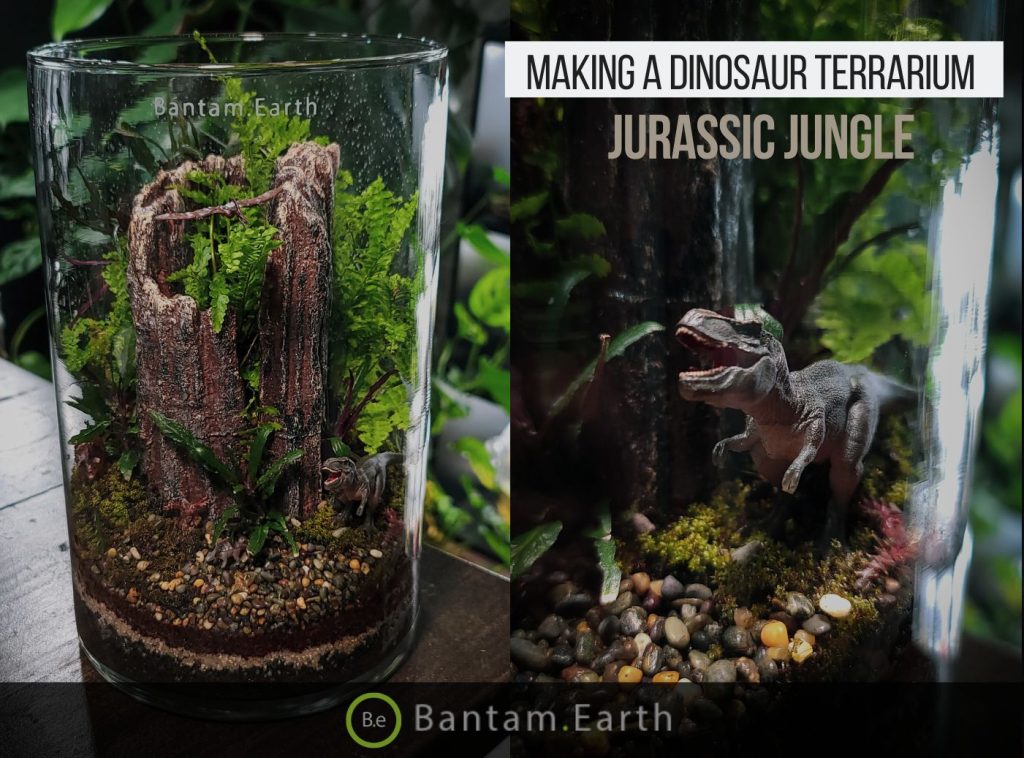I feel like there’s an endless amount of ideas we could pursue when it comes to making a dinosaur terrarium! In our last build, we made Jurassic Jungle, a tropical rainforest dystopia with miniature dinosaur models. For today’s project, I have a neat idea for a prehistoric desert terrarium.
If you’re new to the concept of a Bantamarium, I highly recommend checking out the detailed guide I’ve created. In essence, a Bantamarium is a versatile vivarium designed to bring miniature ecosystems to life. It’s a concept I’ve developed to make it easier for anyone—regardless of experience level—to create a thriving, visually stunning vivarium that blends art with nature.


A Fossil Desert Terrarium
The prehistoric theme I have in mind for this desert terrarium will be perfect for our new dinosaur fossil pack. This will officially be my first succulent terrarium tutorial for the site… So I’m excited to see so many new concepts that can be put into one project!
Making A Dinosaur Terrarium
Keeping with the Jurassic Park theme we’ve been exploring in these last few projects, I wanted to roam out a little bit towards a more “life after dinosaurs” look. Making a dinosaur terrarium that utilizes cacti and sand feels like a unique concept from what we would normally find out there. Let’s take a look at what will be needed for this project:
Materials:
- Mega Bantamarium Jar 10″ x 6″
- Dinosaur Fossil Decor Pack I (5x)
- Various Cactus
- Red Desert Gravel
- Mixed Brown Gravel (Pebble)
- Natural Granular Sand
- Coco Fiber Peat Soil
Tools:
The Dinosaur Fossil Pack Decor:
If you haven’t been able to tell that I am truly passionate about the stuff I do here, the detail in these models should say it all. I am so genuinely proud of the way these dinosaur fossils came out, I think I will more than likely use them in other builds.






Creating The Ultimate Prehistoric Desert:
There isn’t a strategic reason for the use of the firework engraved jar on this one. At the time of making this, it was the 4th of July so it’s more of a celebratory statement for the holiday.


Let’s start by pouring gravel in to establish the drainage layer. This is where we will keep access to water for the succulents to hydrate slowly.


The next part of the drainage layer will be coarse-grained sand. This is purely cosmetic but a nice touch of color to separate the drainage layer from the substrate.


Before we continue to add in the substrate layers, let’s start implementing various cacti as we go so we can establish the height of the plant’s positions as we go. The next part of this tutorial will cover plants as well as continue with layering as we go.
Best Plants For A Fossil Desert Terrarium
Succulents and cacti are the best choice of plants for any desert terrarium. Since this will be an open-top build, my usual preference for moss won’t survive long in this type of setup.


I’m using a variety of cacti for this desert terrarium to give a sense of depth. The first one is short and has a conglomerate of pups on it making it a perfect centerpiece.


After elevating the back of the terrarium with coco fiber soil, I add a few taller cacti around the rear area to help offset the overall height of my build. I’m leaving the front area cacti-less and only filling it with soil to even out the substrate.


Now that the terrarium is pretty much set up for success, we can add sand as a soil cover. This part brings on the desert-like characteristics we were all looking for.


As an added aesthetic, I’m lining the front with a bit more gravel. I feel like this helps the desert appear more aged which aids in the prehistoric look I’m going for with this one.


Since we will be adding fossils to this desert terrarium, we will want them to look like they are emerging from the arid substrate… So I’m adding a tiny bit more sand just to make it easy for the models to sink into.


Now for the part, you’re probably not even waiting for me to say… Add the fossils! I don’t necessarily have a strategy for placement here. I put the skulls closer to the front and randomly scattered the rest. I feel like they’re tiny Easter eggs the observer gets to look for when viewing this beautiful setup.


We have pretty much completed the desert terrarium construction and add water if you haven’t already.
Best Animals For A Fossil Desert Terrarium
When deciding on possible critters for a desert terrarium, there are a few things you’ll need to keep in mind. This is an arid setup with very little nutritional resources apart from the plants. You’ll want animals that don’t require high humidity. Beetles and spiders would be my recommendation.
Prehistoric Desert Terrarium Care
The care requirements for this enclosure will be relatively simple… Pruning won’t be a necessity since we are using cacti. Water will need to be added as it evaporates* from the substrate.


Final Thoughts
Here we are, another desert terrarium for the collection. If you haven’t had an opportunity to check out the Jurassic Jungle, you should! It was the motivation behind this one. See you all in the next one!


If you’re interested in seeing updates on how this as well as other enclosures progress follow me on social media. If you’d like to get your tall tweezers on one of these limited edition vivarium decors yourself, check them out in our shop.






